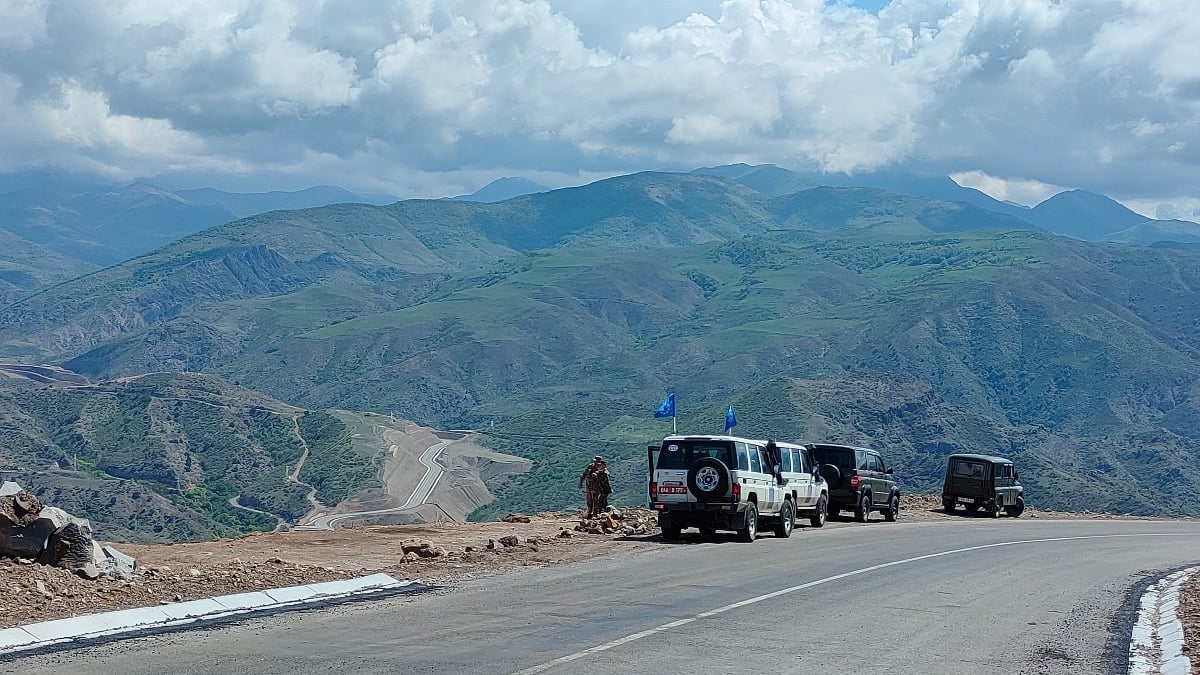During a briefing on June 7th, Russian Foreign Ministry spokesperson Maria Zakharova discussed the EU monitoring mission in Armenia, describing it as a “paramilitary presence” and claiming a “confrontational nature.”
This is not the only statement Russia made about the EU mission last week.
Russian Deputy Foreign Minister Mikhail Galuzin reiterated the Kremlin’s claim that the mission was conducting espionage activities against Russia, Azerbaijan, and Iran.
Zakharova also recited the claim without presenting any facts: “There is no need to look for evidence anywhere. It’s obvious. The anti-Russian, anti-Azerbaijani, anti-Iranian goals of this mission are becoming more and more apparent. Moreover, when NATO countries started to join, everything here became clear for everyone.”
Moscow consistently links the EU civilian mission with NATO, making accusations without providing factual justification.
For example, at the end of March, Russian Foreign Minister Sergey Lavrov falsely claimed that military personnel from Canada, Norway, and the USA were being sent to Armenia as part of the EU mission, turning it into a NATO mission.
Is the EU mission paramilitary?
Zakharova’s claim that the EU has a “paramilitary” presence in Armenia is unfounded.
The EU Mission in Armenia (EUMA) is civilian, moreover, unarmed. They monitor the Armenian-Azerbaijani border on the Armenian side and report the situation to Brussels.
The first EU observation mission commenced on October 20, 2022, and lasted two months. Following a request from the Armenian side, a comprehensive civilian mission was established in February 2023, with a two-year mandate that could be extended.
At the end of the first year of operation, a decision was made to strengthen the observation capacity of the European Union Mission in Armenia (EUMA) by increasing its presence on the ground from 138 staff to 209.
The mission’s observers and civilian experts are from 23 EU member countries, and Canada joined in April 2024.
In addition to Armenia, EU civilian observers have conducted missions in 12 other countries, including neighboring Georgia, since 2008.
Responding to the latest statements from Russia, Markus Ritter, the head of the observation mission, told CivilNet that they do not reflect reality.
“I can assure you that we do not have any hidden agenda. We are a civilian, unarmed mission. We are not what Russia says about us. We are not a covert paramilitary unit or anything like that,” Ritter said.
Why was EUMA established?
The first EU observer mission was sent to Armenia in the autumn of 2022 following Azerbaijan’s incursion into Armenian territory.
This was preceded by two prior attacks from Azerbaijan in 2021, one in the spring and another in the autumn.
As per the official data, Azerbaijan has occupied over 150 square kilometers of Armenia’s sovereign territory as a result of these attacks.
Armenia’s appeals to the Collective Security Treaty Organization, its member security alliance, did not yield any practical benefit.
Instead, the agreement on the EU observer mission was reached on October 6, 2022, during the Prague meeting of the leaders of Armenia, Azerbaijan, France, and the Council of Europe.
Zakharova’s statement that EU initiatives would only lead to the destabilization of the military-political situation contradicts Yerevan’s official stance.
In April, Armenian Foreign Minister Ararat Mirzoyan stated that the presence of the EU mission is “one of the essential contributing factors” in ensuring the stability of the Armenian-Azerbaijani border.
Thus, Maria Zakharova’s claim that the EU has a “paramilitary presence” in Armenia is unfounded. The EU observation mission on the Armenian side of the border with Azerbaijan is civilian. Russia is making false claims by trying to link it with NATO.







